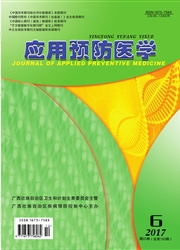

 中文摘要:
中文摘要:
目的了解钦州市VCT 门诊求询者情况,为艾滋病防治政策的制定提供科学依据.方法分析2011-2013 年钦州市VCT 门诊求询者信息和数据.结果2011-2013 年钦州市VCT 求询15 206 人,HIV 抗体检测率99.09%,求询者以20~49 岁所占比重最大为80.61%,到疾病预防控制中心VCT 门诊求询的比例较高为60.60%;2011、2012 年疾病预防控制中心VCT 门诊的HIV 阳性检出率为17.95%和17.02%,高于医疗机构的7.31%(χ ^2=86.563,P〈0.001)和8.18%(χ^2 =79.700,P〈0.001),2013 年疾病预防控制中心和医疗机构VCT 门诊的HIV 抗体阳性率分别为10.53%和9.01%;49.49%的求询原因为高危性行为;“商业异性性行为史”和“配偶/固定性伴阳性”求询者HIV 阳性率较高为28.03%和22.38%.结论钦州市VCT 求询者主要对象是青中年,女性比例逐渐增加,高危性行为是主要求询原因.目前疾病预防控制中心仍是VCT 的主要力量,应充分发挥医疗机构的作用,并扩大VCT 门诊在乡镇/社区的覆盖面.
 英文摘要:
英文摘要:
Objective To understand the status of VCT for HIV in Qinzhou Cities and provide the scientific basis for AIDS policy developing. Methods The VCT data of Qinzhou City during the period 2011 - 2013 from“China information system for diseases control and prevention”was analyzed. Results From 2011 to 2013, among 15 206 people received the VCT services, 99.09%of them accepted the HIV antibody test in Qinzhou and the consultant person’s number in each year increased . Most consultant persons ( 80.61%) were 20 to 49 years old and the proportion of female was increasing. Over 60%of consultant persons used the VCT clinics of CDC. In 2011 and 2012, the HIV positive rates of the consultants using VCT clinics of CDC were higher than those who using hospitals’ VCT clinics;17.95%versus 7.31%in 2011(χ2=86.563, P<0.001) and 17.02%versus 8.18%in 2012 (χ2= 79.700, P< 0.001). While there was no statistical difference between two rates in 2013 (10.53% versus 9.00%). The main reason for consultation of VCT was high-risk sexual behavior (49.49%). HIV positive rates of consultants with “commercial heterosexual history” and “ HIV positive spouse/regular sexual partner” were 28.03%(712/2 540) and 22.38%(422/1 886) respectively, higher than other groups. Conclusion The mainly VCT consultant persons are young men and middle-age men and the percentage of female was increasing. High-risk sexual behavior is the main reason for consulting. CDC has undertaken the important task in Qinzhou City, but the hospitals also play the important role. We should give the hospitals to full play their roles , improve the ability of township and village/community comprehensive prevention and control of AIDS.
 同期刊论文项目
同期刊论文项目
 同项目期刊论文
同项目期刊论文
 期刊信息
期刊信息
